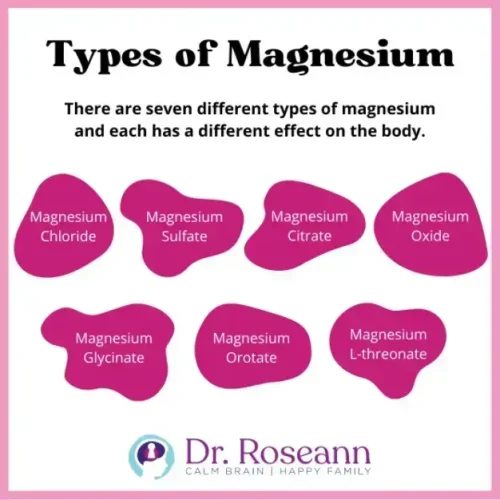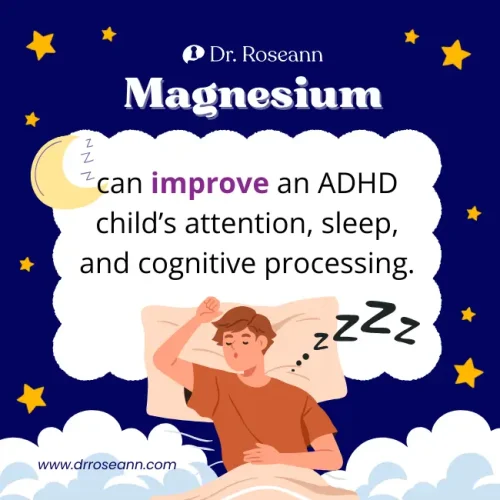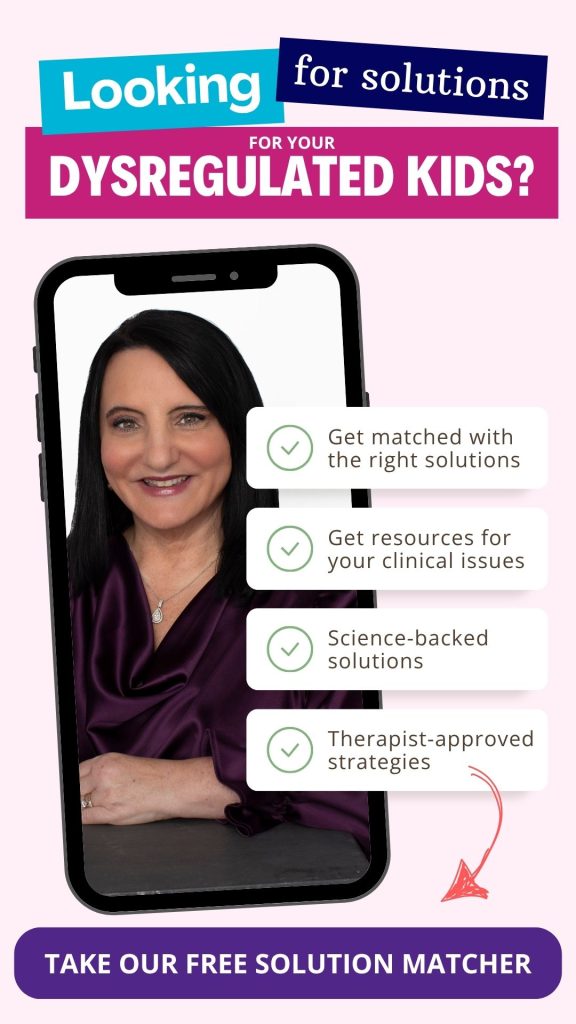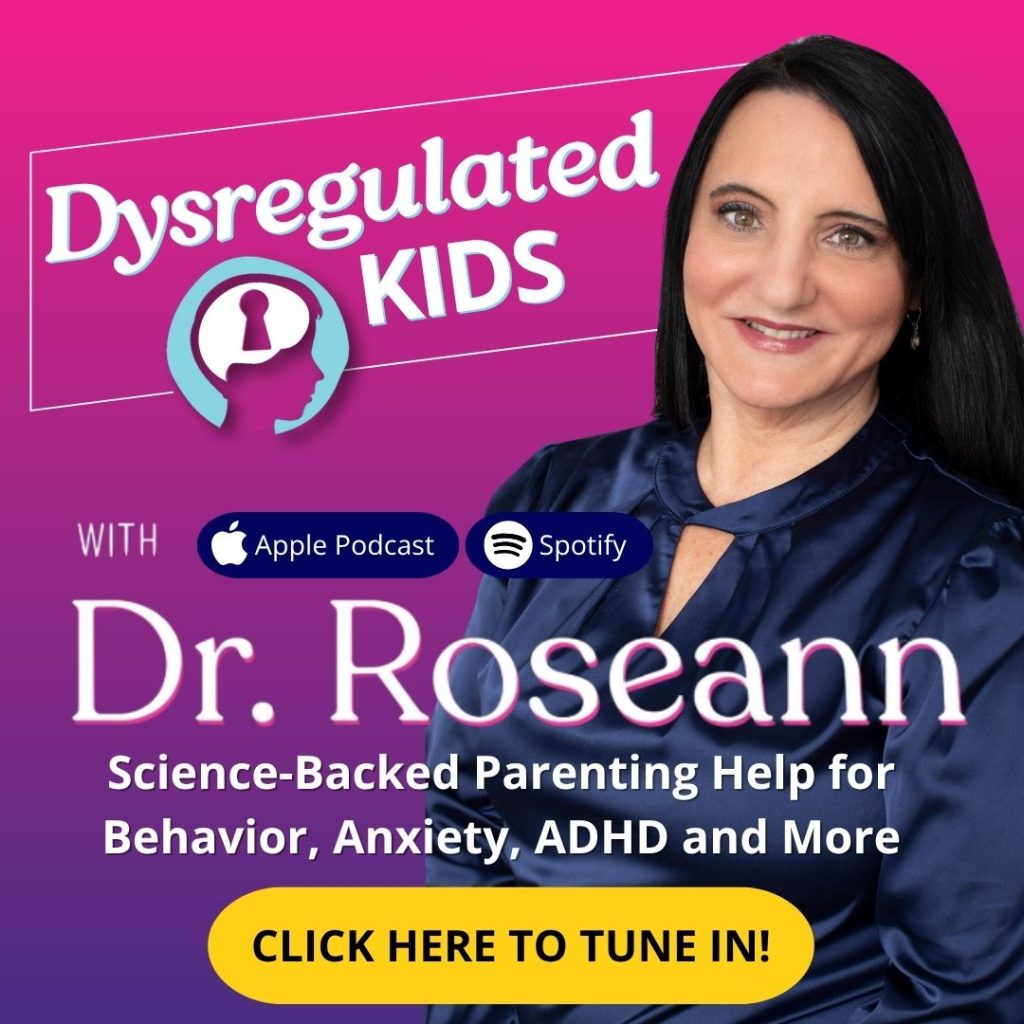Estimated reading time: 8 minutes
Parents often ask me, “What else can I do besides meds or therapy to help my child?” Those options can help yet they often miss the real culprit—a frazzled nervous system.
That’s where magnesium steps in like a quiet helper that never asks for credit. Not some magic fix, rather one of the most studied and safest natural tools for calming brains, lifting moods, and sharpening focus.
When levels drop, kids struggle with irritability, restless nights, and big waves of emotion. Feed the brain what it needs and you unlock more calm, steadier energy, and resilience every day.
What Types of Magnesium for ADHD, OCD, Anxiety, and Depression Are Available?

There are seven main forms of magnesium, and each one works in its own unique way in the body.
- magnesium chloride
- magnesium sulfate
- magnesium citrate
- magnesium oxide
- magnesium glycinate (especially for OCD or anxiety)
- magnesium orotate
- magnesium L-threonate
You can add magnesium through supplements, a calming Epsom salt bath, or even both. Stress often pushes kids’ nervous systems into overdrive, and magnesium helps calm the brain, sharpen focus, and support deep, restorative sleep. Calm the Brain First, Everything Follows.
You’re not alone—these small steps toward regulation really can bring more peace into daily life.
1. Magnesium Calms the Brain
Magnesium is often called the “original chill pill” because it supports more than 300 processes in the body—including how the nervous system runs.
It helps to:
- Boost key neurotransmitters like dopamine and serotonin
- Calm stress responses so the brain isn’t stuck in overdrive
- Promote deep, restorative sleep
- Sharpen focus while easing hyperactivity
As Dr. Carolyn Dean, author of The Magnesium Miracle, puts it: “Magnesium is nature’s relaxant. When the body has enough magnesium, the nervous system can reset more easily—making it especially valuable for kids with ADHD and anxiety.”
And that’s exactly why I remind parents: when we calm the brain first, everything else gets easier.
2. Magnesium Improves ADHD Behaviors
Kids with ADHD often run low on magnesium. That gap can fuel inattention or restless energy that feels impossible to contain. Magnesium helps steady dopamine—the brain’s motivation-and-focus chemical—so kids have a better shot at self-control.
Research even confirms what parents see at home. Effatpanah et al. (2019) found that children with ADHD had much lower magnesium levels than their peers without ADHD.
| Improves attention | Helps filter out constant noise and distractions |
| Reduces hyperactivity | Calms a dysregulated nervous system stuck in overdrive |
| Supports emotions | Less irritability, smoother moods, fewer blowups |
Parent Story
Sarah, mom of a 9-year-old, once faced daily meltdowns after school. With her doctor’s guidance she added magnesium glycinate, and tantrums eased along with homework battles.
“It didn’t fix everything, but it gave him the calm he needed to use the tools we’d been teaching him.” That’s the power of calming the brain first—when regulation improves, kids can finally access the skills we’ve been working so hard to teach them.
3. Magnesium Improves Brain Chemicals that Help Anxiety, OCD, Depression, and ADHD
Magnesium has a bigger impact on stress than most parents realize. By settling the sympathetic nervous system—that fight-or-flight switch—it helps kids step off high alert and out of constant dysregulation.
- Promotes GABA activity – the brain’s built-in calming chemical
- Reduces cortisol – the stress hormone that keeps children stuck in overdrive
- Supports deep sleep – quiets anxious thoughts and restores balance
Low magnesium doesn’t just add fuel to anxiety. It’s also linked to depression in both kids and adults because it boosts serotonin while cooling down brain inflammation.
- Lifts mood by balancing critical neurotransmitters
- Lowers inflammation that clouds thinking and adds sadness
- Strengthens therapy gains when combined with other supports
Research continues to show just how powerful magnesium can be. For example, Kirkland et al. (2018) found that magnesium supplementation improved symptoms across a wide range of mental health and neurological conditions.
When the nervous system finally gets what it needs, kids sleep better, regulate emotions more easily, and benefit from every tool we offer them. And remember my motto: Calm the Brain First, Everything Follows. You’re not alone in this—behavior is communication, not bad parenting.
4. Magnesium Puts The Breaks on the Intrusive Thoughts
For kids with OCD, those nonstop intrusive thoughts and compulsive rituals are really signs of a dysregulated nervous system stuck in a loop.
Magnesium can give the brain the reset it needs by:
- Calming glutamate – that excitatory brain chemical that keeps circuits firing too fast
- Balancing serotonin – supporting mood and flexibility in thinking
- Improving sleep – which naturally lowers nighttime rituals and helps the brain reset
When the brain settles, kids aren’t just less stuck—they’re more open to the tools and therapies that truly move them forward. And remember: when we calm the brain first, everything else gets easier.
5. Magnesium Helps Reduce Anxiety

Anxiety doesn’t just live in the mind—it shows up in the body through tense muscles, racing thoughts, and sleepless nights. Left unchecked, it can wear down mood and even lead to depression.
In many kids, this is really the sign of a dysregulated nervous system stuck in overdrive.
Research shows magnesium plays a key role in reducing many types of anxiety, including:
- Generalized anxiety
- Social anxiety and selective mutism
- Panic disorder
- Separation anxiety
- Specific phobias
Since the pandemic, we’ve seen a surge in kids struggling with social anxiety and selective mutism at our Ridgefield, CT center.
Magnesium helps by regulating the body’s stress response (the HPA axis) and balancing neurotransmitters, giving the brain the calm it needs. The best part? It’s a gentle and supportive option that can complement other treatments.
You can use magnesium in different ways:
- Orally (powders, capsules, gummies)
- Topically (oils, creams, sprays for winding down at night or calming nerves on the go)
- Even through Epsom salt baths for a soothing end-of-day ritual
Remember: when we calm the brain first, kids can finally use the tools and therapies we’re working so hard to teach them. You’re not alone—these small supports make a big difference.
What type of magnesium is best for kids with ADHD or anxiety?
Not all magnesium works the same for kids. These are the ones families often find most helpful:
- Magnesium Glycinate – gentle on the stomach and soothing for anxious or OCD brains
- Magnesium Citrate – supports digestion and regularity
- Magnesium L-Threonate – crosses into the brain to support focus and memory
Always check with your child’s provider, since every brain and body have their own rhythm. Calm the brain first, and everything else gets easier.
What are the signs my child may be deficient in magnesium?
Many kids today are low in magnesium—not just because of diet, but because stress drains the body’s reserves and keeps the nervous system dysregulated. Some common signs include:
- Frequent irritability
- Restless sleep or teeth grinding at night
- Constipation
- Muscle cramps
- Low frustration tolerance
- Anxiety or obsessive behaviors
If you recognize these patterns in your child, you’re not alone. These are clues that the brain and body need more support—not signs of bad behavior.
Read more about: Symptoms of Magnesium Deficiency
How do I safely add magnesium to my child’s routine?
| Diet | Leafy greens, pumpkin seeds, almonds, bananas—even a square of dark chocolate. Simple swaps can steady a busy brain. |
| Supplements | Powders, gummies, or capsules often help kids—always with provider guidance. One small step can lift the weight at home. |
| Baths | Epsom soaks restore. Warm water with magnesium feels like a gentle reset for frayed nerves. |
Real-life Shift
David, 11, battled ADHD, anxiety, and restless nights. After magnesium glycinate at bedtime, he finally slept through—mornings no longer unraveled in meltdowns.
One small change can settle a dysregulated nervous system. Magnesium won’t solve every struggle, yet it often gives kids the steadiness they need for focus, rest, and calmer moods.
When children feel balanced inside, they shine outside—ready for learning, friendships, and growth.
Behavior is communication. Let’s listen closely to what the brain is asking. Decode the behavior, regulate the brain.
Parent Action Steps
FAQs
How long does it take to see results from magnesium?
Parents often notice improvements in sleep and mood within 1–2 weeks, though focus and behavior changes may take longer.
Can magnesium be used alongside other supplements?
Yes. Magnesium works well with supplements like zinc, omega-3s, vitamins B6, B12, C, E, and vitamin D. These combinations can enhance focus, mood stability, and overall brain health.
Can magnesium replace ADHD medication?
Magnesium isn’t a replacement, but it can make other treatments more effective by calming the nervous system.
What’s the best time of day to give magnesium?
Evening works well since it supports calm and sleep, but some kids benefit from split doses.
Citations
Dean, C. (2006). The magnesium miracle (Rev. and updated ed.). Ballantine Books.
Effatpanah, M., Rezaei, M., Effatpanah, H., Effatpanah, Z., Varkaneh, H. K., Mousavi, S. M., Fatahi, S., Rinaldi, G., & Hashemi, R. (2019). Magnesium status and attention deficit hyperactivity disorder (ADHD): A meta-analysis. Psychiatry research, 274, 228–234. https://doi.org/10.1016/j.psychres.2019.02.043
Kirkland, A. E., Sarlo, G. L., & Holton, K. F. (2018). The Role of Magnesium in Neurological Disorders. Nutrients, 10(6), 730. https://doi.org/10.3390/nu10060730
Dr. Roseann is a mental health expert who is frequently called up to give her expert opinion in the media:
- The Warrior Parent Podcast It’s Gonna Be OK! Changing Behaviors and Responses (And The Magic of Magnesium) In Your Family with Dr. Roseann Capanna-Hodge
- She Knows 11 Products Moms of Kids With ADHD Swear By to Maintain Order in the Chaos
- The Healthy 12 Silent Signs of Adult ADHD You Might Be Ignoring
- CBS New York (Article) Experts Offer Tips On How To Help Children Deal With Anxiety.
- Cai Graham: Is it anxiety or OCD?
Always remember… “Calm Brain, Happy Family™”
Are you looking for SOLUTIONS for your struggling child or teen?
Dr. Roseann and her team are all about science-backed solutions, so you are in the right place!











